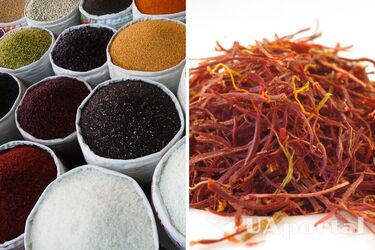Experts explain how to distinguish real saffron: what to look for

Saffron is a spice known for its bright colour, distinctive aroma and unique taste. However, you can often come across counterfeit products on the market and in spice shops.
Experts explained how to distinguish genuine saffron from fake and named the main types of the spice. Spices are usually presented on the shelves in three types, The Iran Project writes.
Kashmir saffron, also known as Moghra saffron, is highly valued for its dark red colour and strong aroma. It is grown in India.
Read also: How to choose real rice: pay attention to the smell
Spanish saffron, also known as "Lamancha saffron", is widely known for its high quality. It is grown in the La Mancha region of Spain and is known for its bright red colour, strong aroma and well-balanced taste.
Iranian saffron, also known as Persian saffron, is one of the most famous and sought-after varieties in the world. It is cultivated in Iran, particularly in the Khorasan region, and is valued for its deep red colour, exquisite aroma and rich flavour.
To identify real saffron, it is important to understand the characteristics of the spice:
Bright colour
Genuine saffron is coloured deep red in all the threads. The intensity of the colour may vary slightly depending on the variety, but it should never look dull or pale. Orange or yellow saffron indicates impurities or fake.
Read also: Pay attention to the packaging and read the ingredients: how to choose a quality ice cream
Aroma
Real saffron has a strong, distinct aroma. The spice smells like flowers, honey and slightly metallic. It should be aromatic, without unpleasant and musty smells. If the saffron has no noticeable aroma, it is most likely of lower quality.
Taste
Real saffron has a complex and powerful flavour profile. It should have a slightly bitter taste with hints of honey and hay. The flavour should be intense, but not overpowering. If the saffron tastes mild or has a bitter aftertaste, it is probably not genuine.
Water solubility
When real saffron threads are added to warm water or milk, they should gradually release their colour, giving a golden hue. Fake saffron can quickly discolour or leave artificial colouring.
As a reminder, we have already written how to make natural ice cream.
If you want to get the latest news about the war and events in Ukraine, subscribe to our Telegram channel!
